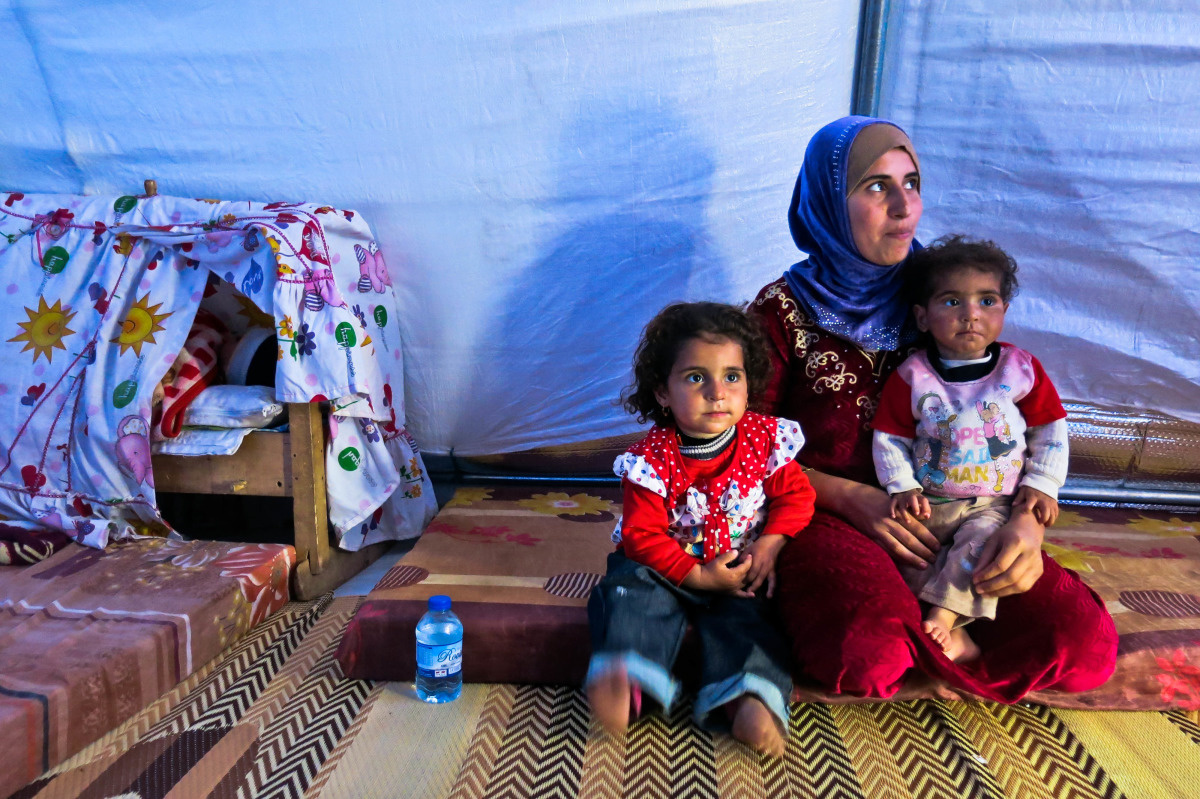“I’m scared for my daughter”
Nearly a month ago, Sinat’s family arrived in Khazer camp, where some 30,000 people who have fled Mosul and its surroundings now live. Sinat suffers from cerebral palsy and her parents are worried about her health. She was recently visited by one of Handicap International’s teams, who immediately began providing her with physiotherapy care.

Mohamad, physiotherapist, and Sinat, in the tent. | © E. Fourt / Handicap International
Hana is sitting on the floor holding two of her three children in her arms. Nearly two years old, Sinat is deep asleep. Next to her, her four-month-old brother watches Handicap International’s team enter the family’s tent. Mohamad, physiotherapist, and Diana, social worker, introduce themselves to Hana. The team was made aware of Sinat’s condition by neighbours and they have come to see if they can help. Hana accepts the team’s offer and invites them to sit on the mattresses laid out on the floor, next to a wooden cradle. Sinat wakes up and Mohamad takes her in his arms. “I only learned about my daughter’s condition recently,” Hana tells the physiotherapist.
“The day she was born, she didn’t cry and I instantly knew something was wrong. The doctors told me she had difficulties breathing but that everything would be okay. They operated on her and explained that her next health check would be in a year’s time. I only was informed that she suffers from cerebral palsy two months ago,” she adds.
Mohamad makes an initial assessment of Sinat’s health. “Her spine and hip are severely deformed. She can’t do without physiotherapy and she needs it straightaway, otherwise it will get worse very quickly,” he explains as he does exercises with the baby. He talks through each movement with Hana, so she can do the same from now on. Sinat’s mother concentrates hard, asks questions and follows the physiotherapist’s movements very carefully.
“I’m really scared for her,” Hanna admits to Mohamad. “We’ve been through two years of worry, executions, threats and explosions of all kinds. I can’t complain about life in the camp, Thank God, but I’m still really worried about my children’s future. Sinat worries me most because of her illness. I really want her to grow up like other little girls her age.”
 Hana and her three children in their tent. © E. Fourt / Handicap International
Hana and her three children in their tent. © E. Fourt / Handicap International
Mosul emergency: Fighting between armed groups and government forces in Iraq in recent years has caused the displacement of more than 4 million people. An estimated 10 million civilians already need humanitarian assistance in the country. The Mosul offensive represents an unprecedented challenge for humanitarian organisations. According to the United Nations, this military operation could cause the displacement of one million people in the worst-case scenario, making it the most serious humanitarian crisis of 2016. Many families have already begun to flee fighting over the last weeks.




